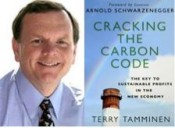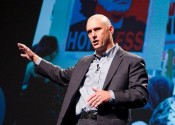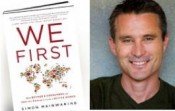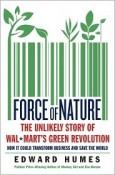Free Forum Q&A – TERRY TAMMINEN, frmr Secy Cal EPA CRACKING the CARBON CODE Sustainable Profits in the New Economy
Written on September 4th, 2013 |
Aired 09/02/12
When I first met TERRY TAMMINEN, he was living on a houseboat in the Marina and filling a position he’d founded as the first Santa Monica Baykeeper. No too long before that, he had been running a pool services company. And not too long after, he was Secretary of the California EPA.
Tamminen has reinvented himself successfully in several very different worlds — business, government, non-profit, foundation, from the grassroots to the halls of power. All of this for a long time now to achieve a sound and healthy relationship between society and the environment. He pursues that consistent vision with whatever works.
We’ll talk about the ideas in his book, CRACKING THE CARBON CODE: The Key to Sustainable Profits in the New Economy – which is very much a plan of action for companies who figure out that reducing carbon emissions reduces waste and is therefore good for the bottom line. He’ll tell stories of companies that have made or saved money by cutting carbon.
How has he been able to move things forward through politics and government in an era when so little seems to get done? Bottom line, are we moving fast enough? If not, how do we integrate all these different players to accelerate movement in the right direction?
Q&A: Mark Mykleby, Natl Security=Sustainability
Written on April 8th, 2013 |
Aired: 04/07/13
In the preface to an article entitled A National Strategic Narrative, Anne-Marie Slaughter of Princeton says we need a narrative that confronts some of the following questions, “Where is the United States going in the world? How can we get there? What are the guiding stars that will illuminate the path along the way? We need a story with a beginning, middle, and projected happy ending that will transcend our political divisions, orient us as a nation, and give us both a common direction and the confidence and commitment to get to our destination.” She also writes, “In one sentence, the strategic narrative of the United States in the 21st century is that we want to become the strongest competitor and most influential player in a deeply inter-connected global system, which requires that we invest less in defense and more in sustainable prosperity and the tools of effective global engagement.”
Over time, the best way to shape the force of the future is to invest in the science, technology, education, and training that will equip our soldiers, sailors, airmen, and marines to adapt to an increasingly complex and dynamic environment. The hardware and software we buy and build are secondary to the gray matter we must cultivate now.
When I hear that someone high up in the military is talking seriously about sustainability, I take notice.
www.newamerica.net
Q&A: SIMON MAINWARING – Author, WE FIRST
Written on November 30th, 2011 |
Aired 11/27/11
At a time when social media is being utilized to coordinate protests against the domination of our economy, our government, and our society by corporations and the very wealthy individuals who profit most from them, SIMON MAINWARING sees a hopeful path to save society from capitalism’s worst excesses. http://wefirstseminar.com/
A social media expert with global experience with brands such as Nike, Toyota and Motorola- he offers a new brand model in which they leverage social media to earn consumer goodwill, loyalty and profit, while promoting sustainable social change through contributions from customer purchases.
The goal of We First is a sustainable practice of capitalism. It is based on the belief that selfish Me First thinking hurts our businesses and the lives of millions of people around the world. It asserts that a brighter future depends on an integration of profit and purpose within the private sector. To achieve this, companies and customers must become partners in social change to build a better world.
Could such innovative partnerships (with shared goals) practice capitalism in a way that satisfies the need for both profit and a healthy, sustainable planet? How realistic is his vision at a time when greed keeps consolidating gains? How much difference could it make even if successful? What has MAINWARING seen in working with these brands that makes him talk about his vision as a likely alternative?
Q&A: ED HUMES, Pulitzer-prize winning author
Written on June 9th, 2011 |
Aired 06/07/11
Pulitzer-prize winning author Ed Humes has a new book -- FORCE OF NATURE: The Unlikely Story of Wal-Mart's Green Revolution -- that starts with the same sort of skepticism, asks some of the same questions, and ends up delivering a lot of good news.
He reports that Wal-Mart has embraced an unprecedented green makeover, which is now spreading worldwide. The retail giant is leveraging the power of 200 million weekly customers to drive waste, toxins, and carbon emissions out of its stores and products. Neither an act of charity nor an empty greenwash, Wal-Mart's green move reflects a simple, compelling philosophy: that the most sustainable, clean, energy-efficient, and waste-free company will beat its competitors every time. Not just in some distant, Utopian future but today.
